Celebrity Myxer has nominated one person each day of Black History Month! This contribution will showcase their achievements, exemplifying their stake in history as an individual of Black Excellence!
Black History Month Person of the Day
Quickly Jump to the Person of the day:
- Dr. Martin Luther King, Jr. (February 1)
- Madam C.J. Walker (February 2)
- Shirley Chisholm (February 3)
- Malcolm X (February 4)
- Diana Ross (February 5)
- President Barack Obama (February 6)
- Maggie Lena Walker (February 7)
- Ida B. Wells (February 8)
- Alicia Garza, Patrisse Cullors & Opal Tometi (February 9)
- Garrett Morgan (February 10)
- Tyler Perry (February 11)
- Aretha Franklin (February 12)
- Oprah Winfrey (February 13)
- Nelson Mandela (February 14)
- Sojourner Truth (February 15)
- Harriet Tubman (February 16)
- Maya Angelou (February 17)
- Angela Davis (February 18)
- Joan Higginbotham (February 19)
- Nat Turner (February 20)
- Huey P. Newton, Ph.D. (February 21)
- Nat Turner (February 22)
Related: Honoring Black Excellence Leaders Who Paved The Way!
Dr. Martin Luther King, Jr. (February 1)
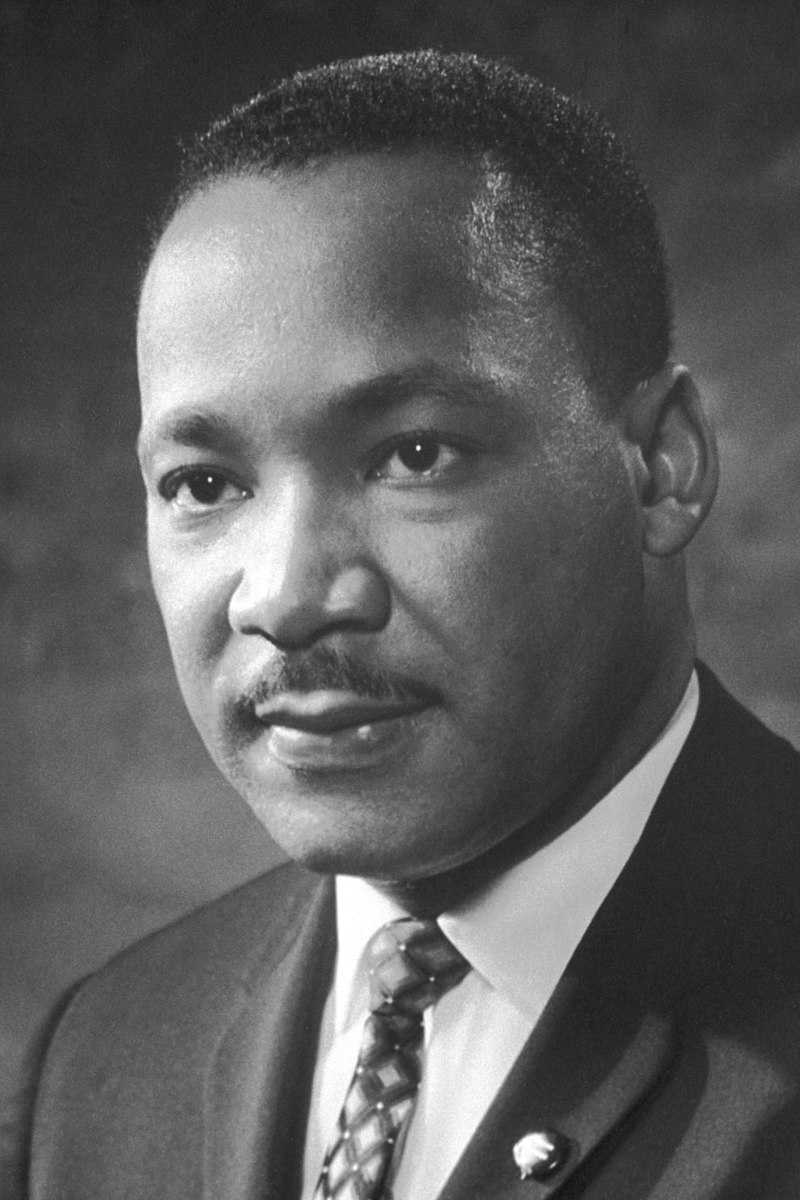
Dr. Martin Luther King, Jr. in 1964 (Photo credit: Nobel Foundation)
January 15, 1929 – April 4, 1968
- Nobel Peace Prize: Dr. King received the Nobel Peace Prize in 1964 for his work in fighting racial inequality through nonviolent resistance, marking him as a global symbol for peace and justice.
- Montgomery Bus Boycott: He played a pivotal role in the successful Montgomery Bus Boycott (1955-1956), which led to a Supreme Court ruling declaring segregation on public buses unconstitutional.
- Civil Rights Act of 1964: Dr. King was instrumental in the passage of the Civil Rights Act, which outlawed discrimination based on race, color, religion, sex, or national origin and ended unequal application of voter registration requirements and racial segregation in schools, at the workplace, and by facilities that served the general public.
- Voting Rights Act of 1965: His efforts also contributed significantly to the passage of the Voting Rights Act, which aimed to overcome legal barriers at the state and local levels that prevented African Americans from exercising their right to vote.
- March on Washington: He led the 1963 March on Washington, where he delivered his historic “I Have a Dream” speech, articulating his vision of a society where race would not dictate a person’s life prospects, which became a symbol of the civil rights movement.
Watch “Genius: MLK/X” on Disney+ and Hulu, starring Kelvin Harris Jr., Aaron Pierce, and Jayme Lawson.
Madam C.J. Walker (February 2)

Madam C.J. Walker (Photo credit: Scurlock Studio, Smithsonian Institution, National Museum of American History)
December 23, 1867 – May 25, 1919
- First Female Self-Made Millionaire: Madam C.J. Walker is widely regarded as the first African American woman to become a self-made millionaire through her line of hair care products designed specifically for African American women.
- Pioneering Hair Care and Beauty Products: She developed and marketed a successful line of beauty and hair products for black women through her company, Madam C.J. Walker Manufacturing Company, providing jobs and economic empowerment to thousands of women.
- Philanthropy and Activism: Walker was known for her philanthropy and activism. She made substantial financial donations to numerous organizations and became a patron of the arts. She was also a strong advocate for African American rights and the anti-lynching movement.
- Walker’s Legacy and Cultural Impact: Her success as an entrepreneur and her extensive work in philanthropy and social activism laid the groundwork for future generations of African American entrepreneurs and activists, contributing significantly to the economic empowerment and civil rights for African Americans.
Shirley Chisholm (February 3)
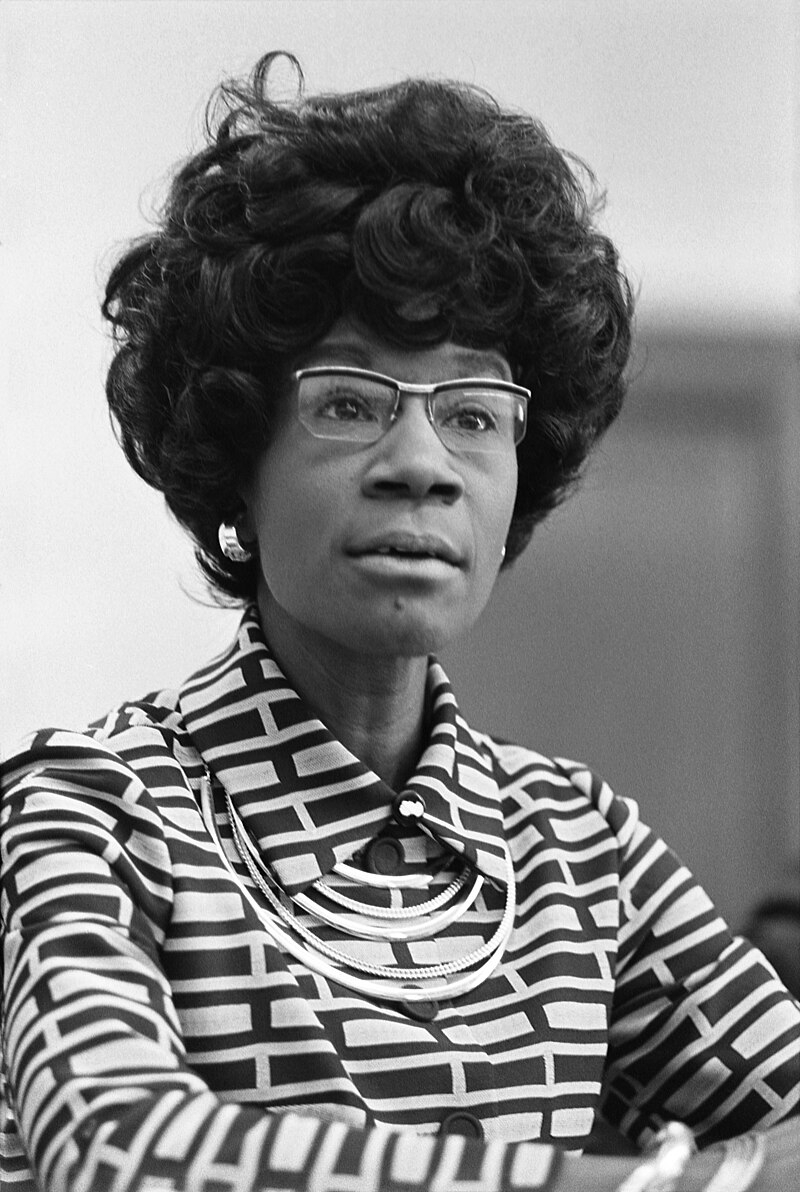
Shirley Chisholm (Photo credit: Adam Cuerden)
November 30, 1924 – January 1, 2005
- First Black Woman Elected to the U.S. Congress: Shirley Chisholm made history in 1968 by becoming the first African American woman elected to the United States Congress, representing New York’s 12th Congressional District for seven terms from 1969 to 1983.
- First Major-Party Black Candidate for President of the United States: In 1972, Chisholm became the first black candidate for a major party’s nomination for President of the United States, and the first woman to run for the Democratic Party’s presidential nomination.
- Advocacy for Minority Education and Employment Opportunities: Throughout her career in Congress, Chisholm was a passionate advocate for education, healthcare, and social services, focusing particularly on the needs of minority and disadvantaged communities.
- Cofounder of the Congressional Black Caucus: Chisholm was a founding member of the Congressional Black Caucus (CBC) in 1971, which aimed to address the legislative concerns of black and minority communities.
Malcolm X (February 4)

Malcolm X (Photo credit: Ed Ford, World Telegram staff photographer – Library of Congress. New York World-Telegram & Sun Collection)
“We are peaceful people, we are loving people. We love everybody who loves us. But we don’t love anybody who doesn’t love us. We’re nonviolent with people who are nonviolent with us. But we are not nonviolent with anyone who is violent with us. Whatever kind of action program can be devised to get us the thing that are ours by right, then I’m for that action no matter what the action is.”
— Malcolm X
May 19, 1925 – February 21, 1965
- Advocacy for Black Empowerment and Nationalism: Malcolm X was a prominent figure in the civil rights movement, advocating for black empowerment, self-sufficiency, and a strong sense of black identity. He was known for his eloquent and passionate speeches that challenged the mainstream civil rights movement’s emphasis on nonviolent protest.
- Influential Role in the Nation of Islam: As a minister and national spokesperson for the Nation of Islam, Malcolm X was instrumental in the growth of the organization, which promoted black self-reliance and the return to African roots.
- Formation of the Organization of Afro-American Unity (OAAU): After leaving the Nation of Islam, Malcolm X founded the OAAU, a secular group that advocated Pan-Africanism and sought to build ties between African Americans and the nations of the African diaspora.
- Reevaluation and Broadening of Perspective: Near the end of his life, Malcolm X’s perspectives broadened, particularly after his pilgrimage to Mecca (Hajj), leading him to advocate for racial unity and cooperation, and to distance himself from the more controversial teachings of the Nation of Islam regarding race.
Watch “Genius: MLK/X” on Disney+ and Hulu, starring Kelvin Harris Jr., Aaron Pierce, and Jayme Lawson.
Diana Ross (February 5)
March 26, 1944 – Present
- Lead Singer of The Supremes: Diana Ross gained fame as the lead singer of The Supremes, one of the most successful vocal groups of the 1960s, producing hits like “Stop! In the Name of Love” and “You Can’t Hurry Love,” which became anthems of the era.
- Successful Solo Career: Ross embarked on a highly successful solo career in the 1970s, delivering chart-topping hits such as “Ain’t No Mountain High Enough” and “Upside Down,” showcasing her versatility and influence in the music industry.
- Achievements in Film: Beyond her musical success, Ross earned critical acclaim for her acting, particularly for her portrayal of Billie Holiday in the film “Lady Sings the Blues,” for which she received an Academy Award nomination.
- Icon of Fashion and Beauty: Diana Ross is also celebrated for her iconic fashion and beauty, influencing trends and setting standards in the entertainment industry, further solidifying her status as a cultural icon.
President Barack Obama (February 6)

President Barack Obama (Photo credit: Official White House Photo by Pete Souza)
August 4, 1961 – Present
- First African American President: Barack Obama made history by being elected as the 44th President of the United States in 2008, and re-elected in 2012, becoming the first African American to hold the office.
- Affordable Care Act (Obamacare): His presidency is notably marked by the passage of the Affordable Care Act, a major healthcare reform aimed at reducing the cost of healthcare and expanding insurance coverage to millions of uninsured Americans.
- Economic Recovery and Reforms: Obama took office during the Great Recession and implemented the American Recovery and Reinvestment Act and other measures to stabilize the financial system, rescue the auto industry, and gradually lead the country to economic recovery.
- Advancement of Civil Rights and Social Issues: He advocated for and achieved significant progress in civil rights, including the endorsement of same-sex marriage, and took executive actions on immigration and gun control, among other issues.
Maggie Lena Walker (February 8)
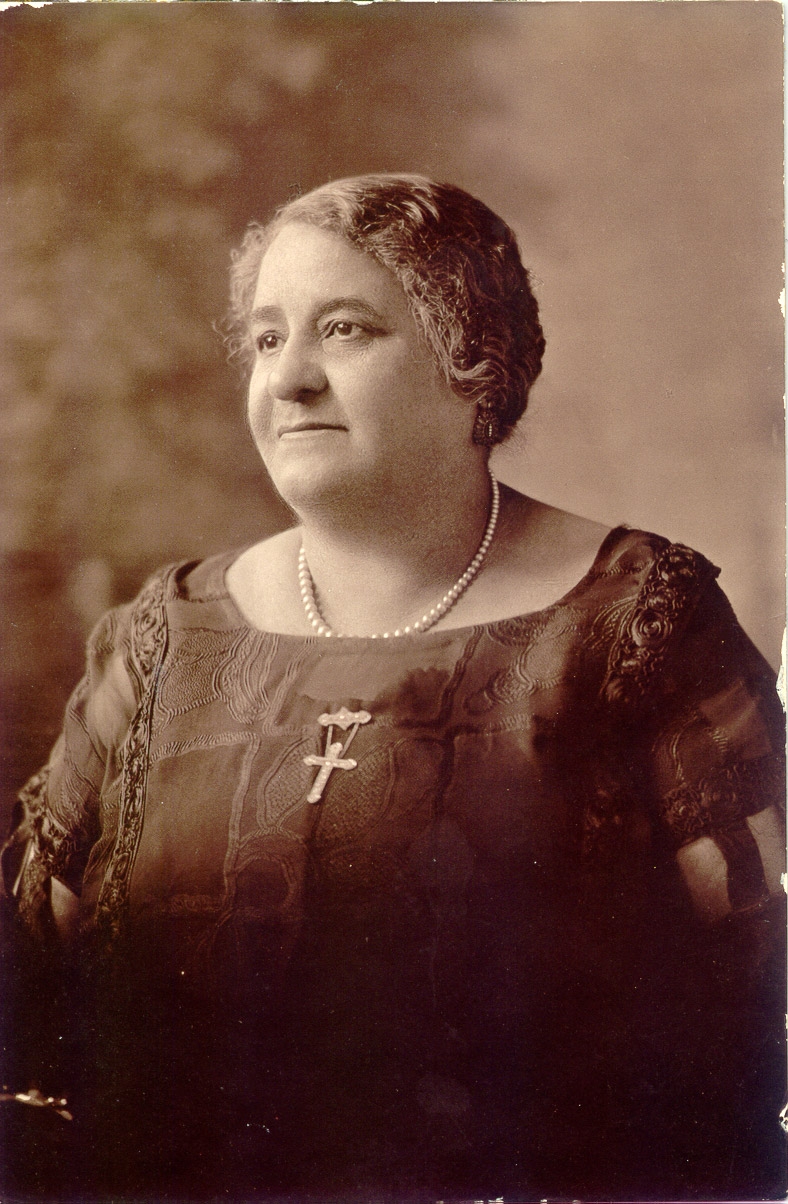
Maggie Lena Walker (Photo credit: National Park Service – Maggie L Walker National Historic Site)
July 15, 1864 – December 15, 1934
- First Female Bank President: Maggie Lena Walker achieved a historic milestone by becoming the first African American woman to charter a bank in the United States, and subsequently the first woman of any race to serve as a bank president, with the founding of the St. Luke Penny Savings Bank in 1903.
- Empowerment of African Americans and Women: Through her leadership, Walker focused on economic empowerment for African Americans and women, encouraging them to save their money, own homes, and start businesses, significantly contributing to the growth of the African American middle class in Richmond, Virginia.
- Community and Civic Leader: Beyond her banking achievements, Walker was deeply involved in her community, leading the Independent Order of St. Luke, an African American fraternal organization that provided social support, health care, and insurance for its members at a time when such services were not widely available to African Americans.
- Education and Youth Advocacy: She was a staunch advocate for education and youth development, establishing educational programs and contributing to the establishment of a newspaper, The St. Luke Herald, to promote African American businesses and share news relevant to the African American community.
Ida B. Wells (February 8)

Ida B. Wells (Photo credit: Mary Garrity, restored by Adam Cuerden)
July 16, 1862 – March 25, 1931
- Crusade Against Lynching: Ida B. Wells was a pioneering African American journalist and activist who led an anti-lynching crusade in the United States during the late 19th and early 20th centuries. Her investigative journalism exposed the brutality of lynching and its use as a tool of racial terror against African Americans.
- Co-founder of the NAACP: Wells was among the founders of the National Association for the Advancement of Colored People (NAACP) in 1909, an organization formed to fight racial discrimination and promote civil rights for African Americans.
- Women’s Suffrage Advocacy: Apart from her anti-lynching campaign, Wells was also a prominent figure in the women’s suffrage movement, advocating for the voting rights of women, particularly those of African American women.
- Pioneering Role in Journalism: As a journalist, Wells used her writing to challenge racial and gender discrimination. She owned and edited the Memphis Free Speech and Headlight newspaper, where she published her findings and opinions on racial injustice, becoming one of the first African American women to own and operate a newspaper in the United States.
Alicia Garza, Patrisse Cullors & Opal Tometi – Creators of Black Lives Matter (February 9)

Alicia Garza, Patrisse Cullors & Opal Tometi – Creators of Black Lives Matter (Photo credit: BLM)
- Organizers, freedom fighters, and justice seekers.
- Creators of Black Lives Matter, a chapter-based national organization formed in 2013 to improve the lives of African Americans and rebuild the Black Nationalist Movement.
- Garza co-founded the BLM with Cullors and Tometi as a call to action after an unarmed teenager, Trayvon Martin, was killed and his murderer went free.
- Cullors is an advocate for criminal justice reform in Los Angeles.
- Tometi serves as executive director and guides various chapters in the works they do when leading demonstrations, protesting institutional racism, and taking legal stands against injustices.
Garrett Morgan (February 10)

Garrett Morgan (Photo credit: US Department of Transportation)
March 4, 1877 – July 27, 1963
- Inventor of the Gas Mask: Garrett Morgan patented the Safety Hood and Smoke Protector in 1914, a device that allowed firefighters and rescue workers to breathe safely in smoke-filled environments. This invention proved its worth in saving many lives and laid the groundwork for the development of modern gas masks.
- Development of the Traffic Signal: Morgan invented and patented a traffic signal device in 1923 that featured a warning light to alert drivers of an impending stop. His invention contributed to the development of the traffic light systems used worldwide today, enhancing road safety.
- Advocate for African American Advancement: Beyond his inventions, Morgan was an advocate for the African American community, using his success to promote racial equality. He was also a notable entrepreneur, founding the Cleveland Call newspaper, which reported on issues relevant to the African American community.
- Pioneering Businessman: As a businessman, Morgan owned several businesses, including a sewing machine repair shop and a garment factory, demonstrating his versatility and contributing to the economic development of his community.
Tyler Perry (February 11)

Alexus Renee interviews Tyler Perry on Celebrity Myxer
September 13, 1969 – Present
- Successful Entertainment Empire: Tyler Perry built a vast entertainment empire from the ground up, creating the iconic character Madea and producing a series of successful plays, movies, and TV shows that blend humor with themes of family, adversity, and forgiveness.
- Ownership of Tyler Perry Studios: He opened Tyler Perry Studios in Atlanta, one of the largest film studios in the United States, making him the first African American to own a major film studio outright, showcasing his significant influence in the entertainment industry.
- Philanthropic Efforts: Perry is known for his extensive philanthropy, including large donations to causes supporting the African American community, disaster relief, and anti-homelessness initiatives, as well as personal acts of kindness like paying off layaway accounts and funding college scholarships.
- Pioneering Achievements in Film and Television: Perry has received numerous accolades for his work, including being awarded the Governors Award at the Emmys in 2020 for his achievements in television and his commitment to offering opportunities to marginalized communities.
Aretha Franklin (February 12)
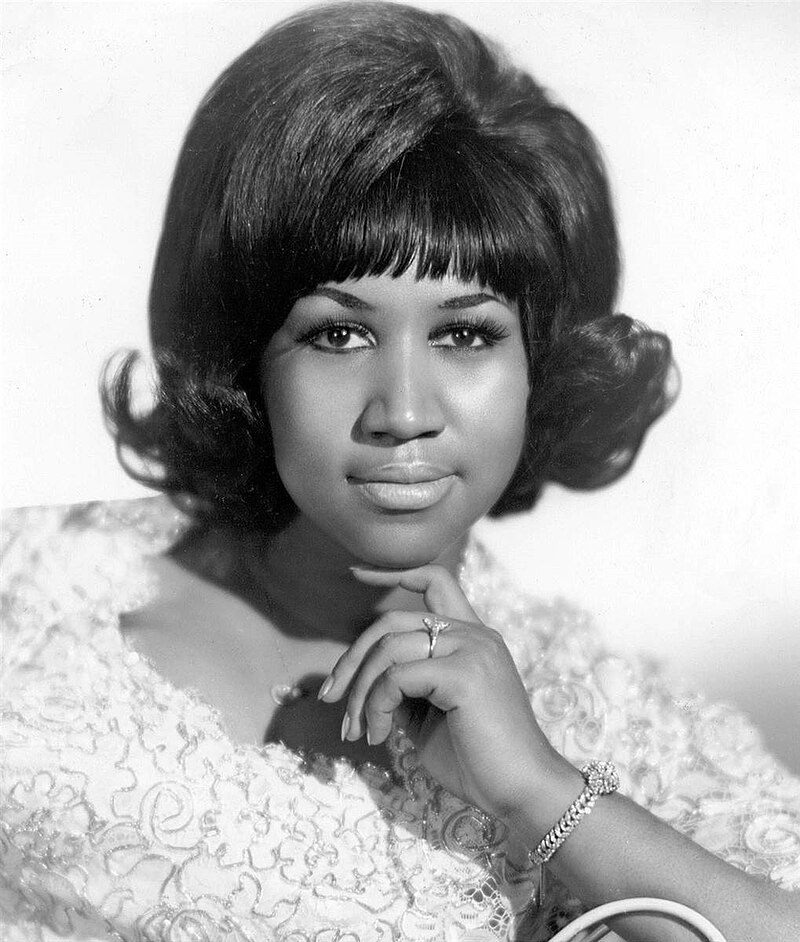
Aretha Franklin (Photo credit: Billboard)
March 25, 1942 – August 16, 2018
- Queen of Soul: Aretha Franklin earned the title “Queen of Soul” for her powerful, soulful voice that shaped the sound of R&B and soul music. Her hits like “Respect,” “(You Make Me Feel Like) A Natural Woman,” and “Chain of Fools” became anthems of empowerment and emotion.
- First Woman Inducted into the Rock & Roll Hall of Fame: In 1987, Franklin became the first woman to be inducted into the Rock & Roll Hall of Fame, highlighting her pioneering role in the music industry and her influence on generations of musicians.
- Multiple Grammy Awards: Over her career, Franklin won 18 Grammy Awards, including the first eight awards given for Best Female R&B Vocal Performance, showcasing her unmatched talent and contribution to music.
- Presidential Performances and Honors: Aretha Franklin performed at the inaugurations of three U.S. Presidents—Jimmy Carter, Bill Clinton, and Barack Obama—signifying her cultural and national significance. She was also awarded the Presidential Medal of Freedom in 2005 for her contribution to American music and culture.
Oprah Winfrey (February 13)
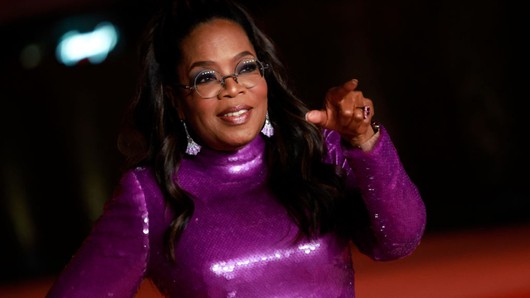
Oprah Winfrey (Photo credit: Oprah.com)
January 29, 1954 – Present
- Pioneering Talk Show Host: Oprah Winfrey revolutionized daytime television with “The Oprah Winfrey Show,” which ran for 25 years and became the highest-rated talk show in American television history, blending entertainment with deep, personal storytelling and self-improvement themes.
- First Black Female Billionaire: Oprah broke barriers in the business world, becoming the first African American woman to achieve billionaire status, thanks to her savvy investments, media ownership, and brand endorsements, showcasing her acumen and influence.
- Philanthropy and Advocacy: Oprah’s philanthropic efforts are extensive, including her Oprah Winfrey Foundation and the Oprah Winfrey Operating Foundation, which focus on education, empowering women and children worldwide, and other charitable activities.
- Influential Book Club: Her Oprah’s Book Club has made her one of the most influential literary figures in the world, significantly boosting book sales for authors and encouraging reading across the globe.
- Academy and Golden Globe Awards: Although primarily known for her work in television, Oprah has also been recognized for her contributions to film, receiving an Academy Award nomination for her role in “The Color Purple” and an honorary Oscar for her philanthropic work.
Nelson Mandela (February 14)

Nelson Mandela (Photo credit: John Mathew Smith)
July 18, 1918 – December 5, 2013
- End of Apartheid: Nelson Mandela played a pivotal role in dismantling apartheid in South Africa, leading the country towards racial equality and democracy after spending 27 years in prison for his anti-apartheid activities.
- First Black President of South Africa: In 1994, Mandela became South Africa’s first black president, serving until 1999, and focused on reconciliation between the country’s racial groups, peace, and social justice.
- Nobel Peace Prize: Mandela was awarded the Nobel Peace Prize in 1993, alongside then-President F.W. de Klerk, for their work in peacefully ending apartheid and laying the foundations for a new democratic South Africa.
- Global Symbol of Peace and Resistance: Beyond South Africa, Mandela became a global symbol of the struggle against oppression and injustice, inspiring movements for freedom and equality worldwide.
- Philanthropy and Activism: After leaving office, Mandela continued his activism, focusing on combating HIV/AIDS, supporting children’s rights, and promoting peace through the Nelson Mandela Foundation.
Sojourner Truth (February 15)

c. 1797 – November 26, 1883
- Abolitionist and Women’s Rights Advocate: Sojourner Truth was a former slave who became a prominent abolitionist and women’s rights activist in the 19th century, known for her powerful speeches against slavery and for gender equality.
- Famous “Ain’t I a Woman?” Speech: Truth is best known for her extemporaneous speech, “Ain’t I a Woman?” delivered in 1851 at the Women’s Rights Convention in Akron, Ohio, which highlighted the intersection of racial and gender discrimination.
- Recruitment Efforts for Union Army: During the Civil War, Truth helped recruit black troops for the Union Army, believing that their service would aid in the fight against slavery and secure their rights as citizens.
- Advocacy for Freed People’s Rights: After the war, she continued her work by advocating for the rights of freed slaves, working to secure land grants from the federal government for them, although her efforts in this area were largely unsuccessful.
- Legacy and Honors: Truth’s legacy lives on through various honors, including her induction into the National Women’s Hall of Fame and the naming of a NASA Mars Pathfinder rover and a U.S. Navy ship after her, reflecting her significant impact on American history.
Harriet Tubman (February 16)

Harriet Tubman (Photo credit: National Portrait Gallery)
c. 1822 – March 10, 1913
- Conductor on the Underground Railroad: Harriet Tubman is most renowned for her role as a “conductor” on the Underground Railroad, leading over 70 enslaved people to freedom over 13 missions, using a network of safe houses.
- Civil War Nurse and Spy: During the Civil War, Tubman served as a nurse, cook, and even a spy for the Union Army, using her knowledge of the South’s geography to gather intelligence.
- Advocate for Women’s Suffrage: After the war, Tubman became an active proponent of the women’s suffrage movement, working alongside leading suffragettes to fight for women’s right to vote.
- Establishment of the Harriet Tubman Home: In her later years, Tubman dedicated herself to caring for aged and indigent African Americans, establishing the Harriet Tubman Home for the Aged on her property in Auburn, New York.
- Legacy and Recognition: Tubman’s legacy is honored through numerous memorials, schools named in her honor, and her inclusion on the $20 bill, reflecting her status as an American icon of freedom and justice.
Maya Angelou (February 17)
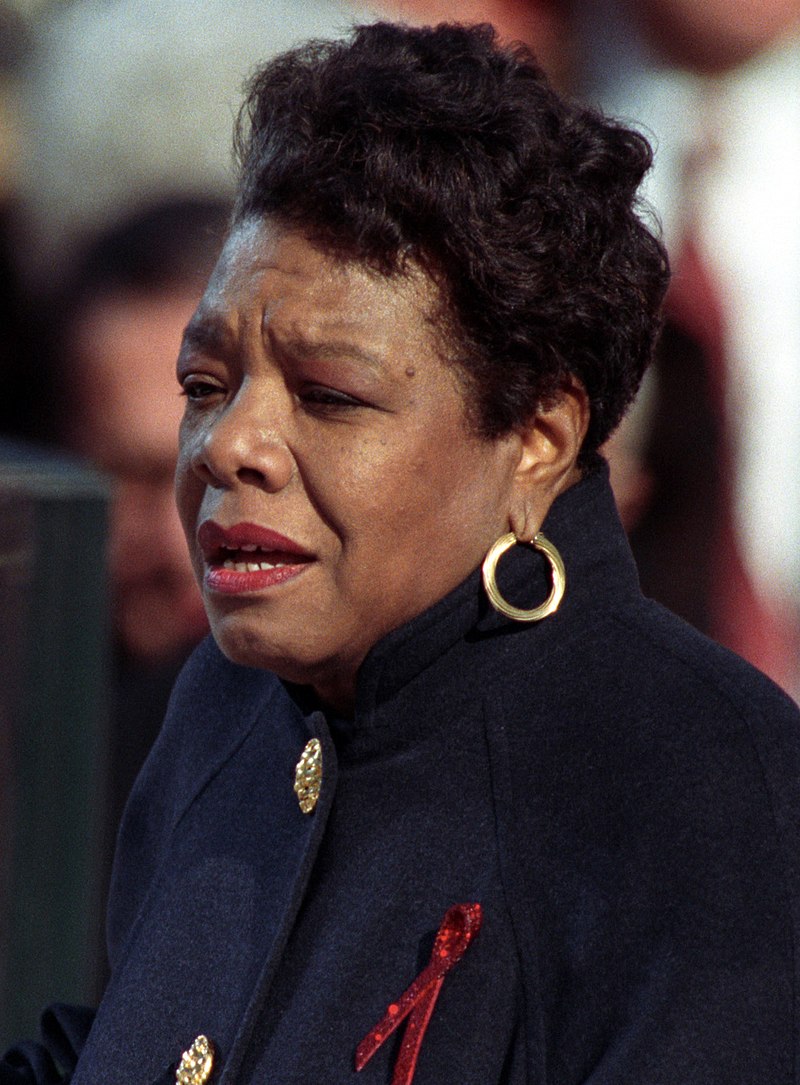
Maya Angelou (Photo credit: William J. Clinton Presidential Library)
April 4, 1928 – May 28, 2014
- Renowned Author and Poet: Maya Angelou is celebrated for her series of seven autobiographies, starting with “I Know Why the Caged Bird Sings” (1969), which detail her early life and the struggles and triumphs of being African American and a woman. Her works have earned critical acclaim and are considered modern American classics.
- Presidential Inaugural Poem: Angelou gained international recognition when she recited her poem “On the Pulse of Morning” at President Bill Clinton’s inauguration in 1993, making her the first poet to make an inaugural recitation since Robert Frost at John F. Kennedy’s inauguration in 1961.
- Activism and Civil Rights: Throughout her life, Angelou was deeply involved in the civil rights movement, working with Martin Luther King Jr. and Malcolm X. Her activism was not only limited to civil rights; she also spoke and wrote about women’s rights and other social justice issues.
- Awards and Honors: Angelou received numerous awards and more than 50 honorary degrees. In 2011, President Barack Obama awarded her the Presidential Medal of Freedom, the United States’ highest civilian honor, recognizing her contributions to literature, culture, and the civil rights movement.
- Broad Career Beyond Writing: Beyond her literary achievements, Angelou was also a talented singer and dancer, performed in stage and film productions, and directed, produced, and starred in films and television series, showcasing her versatile talents.
Angela Davis (February 18)

Angela Davis (Photo credit: Bernard Gotfryd)
January 26, 1944 – Present
- Civil Rights Activist: Angela Davis is renowned for her work as a civil rights activist, particularly during the 1960s and 1970s, where she was involved in movements for social justice, including the fight against racial discrimination in the United States.
- Role in the Black Panther Party and Communist Party: Davis gained national attention for her association with the Black Panther Party and her involvement in the Communist Party USA, advocating for the rights of oppressed people worldwide.
- Academic and Author: Beyond her activism, Davis has had a significant impact as an academic and author. She has taught at several universities and written numerous books on race, class, feminism, and the prison-industrial complex, contributing extensively to critical theory and social justice scholarship.
- Advocate for Prison Reform: Davis is a leading figure in the movement to reform the United States’ prison system, highlighting issues related to mass incarceration, racial justice, and the abolition of the death penalty.
- Influential Speaker and Public Intellectual: With her eloquent speeches and writings, Davis has remained a pivotal figure in discussions on social justice, influencing generations of activists and scholars in the fight against oppression and inequality.
Joan Higginbotham (February 19)

Joan Higginbotham (Photo credit: NASA/JSC)
August 3, 1964 – Present
- Astronaut and Engineer: Joan Higginbotham is recognized for her achievements as an astronaut and electrical engineer. She flew aboard the Space Shuttle Discovery mission STS-116 in December 2006, making her the third African American woman to go into space.
- NASA Contributions: Before her spaceflight, Higginbotham made significant contributions to NASA, working in various capacities at the Kennedy Space Center, including as a payload electrical engineer and participating in 53 space shuttle launches as part of the ground support team.
- Space Shuttle Discovery Mission: On her mission to the International Space Station (ISS), she operated the shuttle’s robotic arm to install components on the ISS, contributing to the construction and maintenance of the station.
- Post-NASA Career and Advocacy: After leaving NASA, Higginbotham continued to inspire in science, technology, engineering, and mathematics (STEM) fields, working in the private sector and participating in educational outreach to encourage young people, especially girls and minorities, to pursue careers in STEM.
- Awards and Recognition: Higginbotham has received numerous awards and honors for her contributions to space exploration and STEM, highlighting her role as a trailblazer and role model in the aerospace community.
Nat Turner (February 20)
October 2, 1800 – November 11, 1831
- Leader of 1831 Slave Rebellion: Nat Turner is best known for leading the most significant slave rebellion in United States history on August 21, 1831, in Southampton County, Virginia. His actions marked a pivotal moment in the antebellum South, highlighting the brutal realities of slavery and the desperate desire for freedom among enslaved people.
- Visionary and Preacher: Turner was deeply religious and claimed to have been divinely inspired to lead the rebellion. He believed that visions and messages from God were directing him to fight against the institution of slavery.
- Impact on American History: The rebellion led to the deaths of approximately 60 white individuals and had a profound impact on the South, resulting in harsher laws against enslaved people and free Blacks, but also fueling the abolitionist movement in the North.
- Legacy of Resistance: Despite the violent suppression of the rebellion and Turner’s eventual capture and execution, his actions became a symbol of resistance and a rallying point for abolitionists and those fighting against slavery and oppression.
- Controversial Figure: Nat Turner’s legacy is complex and viewed differently from various perspectives. While some see him as a hero who fought for freedom, others view the violence of the rebellion with ambivalence. Nonetheless, his life and uprising remain a critical part of American history, reflecting the extreme injustices of slavery and the lengths to which people will go to seek liberation.
Huey P. Newton, Ph.D. (February 21)

Huey P. Newton, Ph.D. (Photo credit: Blair Stapp)
February 17, 1942 – August 22, 1989
- Co-founder of the Black Panther Party: Huey P. Newton co-founded the Black Panther Party in 1966 alongside Bobby Seale. The organization was established to monitor police brutality against African Americans and evolved into a Marxist revolutionary group advocating for African American rights.
- Advocacy for Self-Defense: Newton advocated for African American self-defense against systemic racism and police brutality, challenging the prevailing nonviolent approach of the civil rights movement with a call for armed self-defense in communities.
- Community Social Programs: Under Newton’s leadership, the Black Panther Party initiated numerous community social programs, including free breakfast programs for children, health clinics, and educational programs, demonstrating a commitment to meeting the community’s immediate needs.
- Intellectual Contributions and Activism: Newton was not only an activist but also an intellectual. He earned a Ph.D. in Social Philosophy from the University of California, Santa Cruz, and his writings on race, class, and social justice continue to influence discussions on these issues.
Nat Turner (February 22)
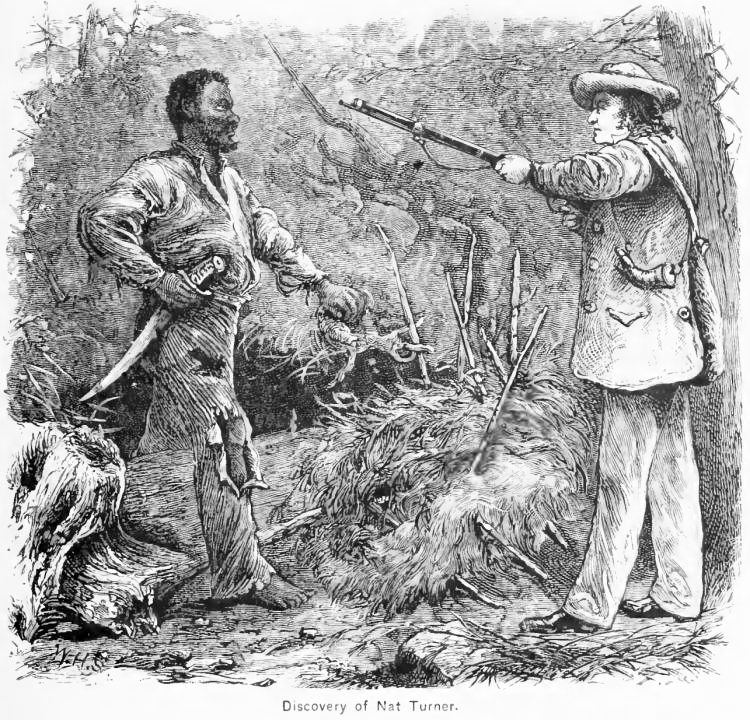
Nat Turner (Photo credit: Encyclopedia Virginia)
October 2, 1800 – November 11, 1831
- Leader of 1831 Slave Rebellion: Nat Turner is best known for leading the most significant slave rebellion in United States history on August 21, 1831, in Southampton County, Virginia. His actions marked a pivotal moment in the antebellum South, highlighting the brutal realities of slavery and the desperate desire for freedom among enslaved people.
- Visionary and Preacher: Turner was deeply religious and claimed to have been divinely inspired to lead the rebellion. He believed that visions and messages from God were directing him to fight against the institution of slavery.
- Impact on American History: The rebellion led to the deaths of approximately 60 white individuals and had a profound impact on the South, resulting in harsher laws against enslaved people and free Blacks, but also fueling the abolitionist movement in the North.
- Legacy of Resistance: Despite the violent suppression of the rebellion and Turner’s eventual capture and execution, his actions became a symbol of resistance and a rallying point for abolitionists and those fighting against slavery and oppression.
Do you want to nominate someone? Let us know in the comments!
Stay right here, stay myxed in every day for the Black History Month Person of the Day!

